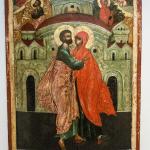![Image of Basil Moreau, C.S.C., founder of the Congregation of Holy Cross - by Congregation of Holy Cross, 6 March 2005 (Official_Moreau_high_density.jpg) (CC BY-SA 3.0 [https://creativecommons.org/licenses/by-sa/3.0/deed.en]), via Wikimedia Commons](https://wp-media.patheos.com/blogs/sites/721/2017/09/Official_Moreau_high_density.jpg)
It was September 14 that year, and having finally started to take my Anglicanism seriously (I grew up in a form of evangelicalism that did not take denominations seriously at all), I had become interested in feast days. I saw that it was the Feast of the Holy Cross, so I assumed that it was the patronal feast of the Congregation of Holy Cross. I therefore sent my Holy Cross priest friend a note wishing him a happy feast day.
He quickly wrote me back. The patronal feast of the Congregation of Holy Cross is not September 14, but September 15: Our Lady of Sorrows.
I recall these chastening thoughts as I have been quite negligent of this blog in the past few weeks, no doubt to the rejoicing of my critics. The Feast of the Universal Exaltation of the Holy Cross has come and gone – the Leave-taking has even happened – yet here I am still thinking about its meaning. Perhaps it is because I took a trip last week to the University of Notre Dame in South Bend, which is run by the Congregation of Holy Cross. My friend Artur Rosman works there now, and he invited me to stay with him for a few days while soaking in the intellectual life of their university.
Soaking in the intellectual life – I think this is where I have been in the last few weeks, as the rancour on the Catholic blogosphere has ratcheted up several notches; despite my protestations that I am Orthodox-in-communion-with-Rome (which I am, and therefore have a foot in Orthodox Internet sometimes too), the food fight on the Catholic interwebz that have even involved my own Patheos colleagues has been exhausting to watch. It has been a rather intellectual fight; it’s been over books, and faculty members, and academic conferences, and all the rest. That it has been over gender and sexuality seems to be only a symptom; what it feels a bit more like is that there is a contingent of very loud voices that wants to take over a sort of intellectual turf, and those of us who work in a kind of public intellectual capacity tend to meet them with disdain, often exacerbating the problem. I am not sure if I should apologize for the small part I have played in this on my social media; to do so would perhaps suggest that I do not think that the concerns of my ‘critics,’ if they can be called that (after all, they do not seem to read me with any critical acumen), are delusional, which would be a false irenicism: those trying to involve me in their Catholic conspiracy theories seem to have built a fantasy world of their own, a Second Life of sorts that has less to do with the online game and more to do with simply being online all the time, and my intentions in egging them on has very little to do with my actual views on the world and is usually due instead to a morbid and perverse fascination with their alternate reality, as actual realities can sometimes be a little boring. I am, after all, a social and cultural geographer who is invested in the theorization of ideology; that I simply cannot help my fascination is perhaps an indication of how much further I have to go in terms of my own holiness, but instead of subjecting myself to the inquisition of the blogosphere, I have reserved this side of my life to sessions with my spiritual father under the seal of confession.
But if I may, perhaps I can offer some reflections on what the founder of the Congregation of Holy Cross has taught me; after all, I did not go to a high school called Moreau Catholic High School without learning anything about Blessed Basil Moreau CSC. Moreau’s educational philosophy has become known to many – refusing to educate the mind without the heart, taking seriously the secular disciplines as much as theology, contextualizing education as a community effort that resembles the Holy Family. But perhaps Moreau’s most poignant lesson comes from his body: nearer to the end of his life, there was a kind of coup within the order he founded over his administrative competence, and he found himself sidelined, marginalized, ostracized, and he died in great sorrow in the care of a convent that he founded in France. Blessed Basil found himself spiritually crucified, experiencing in his very body the care of Our Lady of Sorrows as his heart wept from within him. He was not only humbled – he was humiliated.
Truly, this is a Latin way of looking at the world; this kind of morbid focus on interior suffering is in fact part of a French school of spirituality that is foreign to the Byzantine church in which my body is being formed now. But is it, really? Can not the lived experience of Eastern Catholics be found in such cruciformity? Is there not some universality here, despite the particularities of our local churches? After all, with all the accusations that we are a bunch of latinized uniates – charges that our theologians have not only owned, but sought to correct through liturgical reform over the course of the twentieth century, to varying degrees of success – isn’t the constant charge that we should not exist, that our churches are invalid, and that we will amount to nothing more than political footballs thrown about in the arena of ecumenism a kind of cruciform pedagogy, if not even a kind of humiliating mystagogy?
Perhaps it is in such humiliation that Catholic intellectuals – Latin, Byzantine, or what not – might find a new source of energy in such times that sap us unto fatigue. In this, I am not saying that the Catholic intellectuals being intellectually crucified are, ipso facto, correct; in fact, in time, I hope to voice my criticism of Fr James Martin SJ’s new book on the ‘LGBT community’ and the ‘institutional church,’ and I also wish to provide some critical reflections on the conversation about vulgarity that currently surrounds my Patheos colleague Rebecca Bratten Weiss. Certainly, I have also tried to write in a nuanced way about the Bishop of Rome that has sometimes waxed critical, even as I am in communion with him. Unlike our Lord Jesus Christ, to experience a kind of spiritual crucifixion is not an automatic Christus Victor; nobody is right just because they are a victim. Even Blessed Basil might have to agree with that: it might be said that charismatic founders of orders are not always the best at actual bureaucratic administration.
But still, there is much to be soaked in by being trampled on, especially in terms of the way that power works in an age of far-right populism. The emeritus Bishop of Rome once called on Catholic intellectuals to engage in our online engagements to seek ‘honest and appropriate forms of expression together with attentive and respectful listening,’ rooting our conversation ‘in a genuine and mutual searching for truth if it is to realize its potential to promote growth in understanding and tolerance.’ I suppose it is for this kind of genuine dialogue that we engage in such intellectual conversations on the Internet, and in this, perhaps we are a little naïve. After all, Benedict XVI continues in the same address:
The concept of friendship has enjoyed a renewed prominence in the vocabulary of the new digital social networks that have emerged in the last few years. The concept is one of the noblest achievements of human culture. It is in and through our friendships that we grow and develop as humans. For this reason, true friendship has always been seen as one of the greatest goods any human person can experience. We should be careful, therefore, never to trivialize the concept or the experience of friendship. It would be sad if our desire to sustain and develop on-line friendships were to be at the cost of our availability to engage with our families, our neighbours and those we meet in the daily reality of our places of work, education and recreation. If the desire for virtual connectedness becomes obsessive, it may in fact function to isolate individuals from real social interaction while also disrupting the patterns of rest, silence and reflection that are necessary for healthy human development.
Benedict XVI reminds us that there is a life to be lived offline, that what happens online is part of bodily life but not its sum totality. In fact, there is a true danger of Internet living to become a kind of intellectual obsession, reducing friendship to pure mind without either the body or the heart. Perhaps this is an insight into the far-right populism cultivated by Steve Bannon in the gaming world that came to full fruition in the events of Gamergate in 2014: what happens online is real life, for sure, but there is a danger in it becoming all of life, and when it does, it festers into the invention of fantasy worlds that wreak havoc on actual everyday lives lived with body and heart. It is this power – the colonizing weight of delusional imaginations becoming more real than material reality – by which spiritual crucifixion is being perpetrated.
I do not think I have the right to say that it is in this pit that new founts of creative intellectual energy might be found; dragged as I have been into this maelstrom by one or two people who fancy themselves my trolls, I do not think I am in it enough to say much. But if there is a turf war in the world of Catholic public intellectuals being perpetrated by delusional hordes of online orcs, maybe the lessons of Holy Cross might suggest a way forward in terms of both diagnosis and action.
UPDATE: Friends of mine on the Old Calendar have informed me that as much as my head is in the New Calendar, tonight is their Vigil of the Exaltation of the Holy Cross. What my mind did not know, my body did. Truly, this is the theology of the body.
















